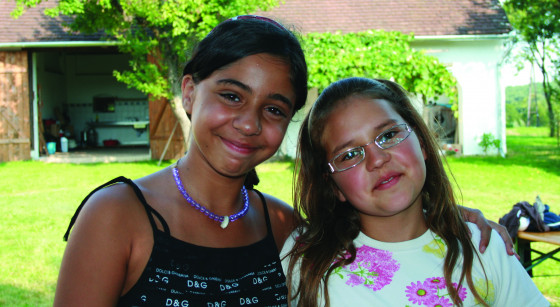Give a Chance to the Gifted – under this name we have launched our programme in 2005 to help gifted children hampered by their circumstances towards developing their full potential backed up by our sponsors in our effort. Supportees and supporters thus build a virtual community under the umbrella of social responsibility to which we add our commitment, professionalism led by our vision of a better society, a better world.We hope to attract our visitors to participate int hat vision. Look at the details.
The Programme Give a Chance to the Gifted was launched in 2005 to help gifted, capable children and young people between the age of 10 to 18, hampered by social handicaps or their families being short of financial means needed for developing their talents or whatever laying in their path to individual growth.
Support is tailored to the individual needs and conditions of the pupils, that can involve scholarships, allowances in kind or offering trainings enhancing certain competences that would contribute to the development of the young individual supported. By eliminating hurdles in developing their potential, it contributes to social mobility.
Details of the support are specified in annual appendices to the frame agreement, relying on a long-term development plan elaborated together with the child in question after he/she reaches 13-14, carefully consulted with his/her parents and school master.
The long-term target we bear in mind and facilitate at best is that finally they should reach a successful life carrier while becoming a happy individual.
We require that the young individual undertakes a commitment, some sort of work that would serve his/her own personal development as a sort of target-agreement. This means an act of taking responsibility for himself/herself, to which we attach great emphasis. Solidarity with other children participating in the programme and responsibility in utilizing the support received is something we also expect from the pupil.
Identification and selection of applicants
Since the very outset of the programme the methods of selection, methods of mentoring have been continuously refined that has led finally to the qualification of the programme as an Excellent Talent Point as audited by the National Talent Council in 2013, reaudited in 2018. The key ingredients of this process have remained the same however.
Applicants can qualify for the programme by submitting a formal written application with support letters by the parents, teachers of the applicant. Interviews with the applicant, their parents and teachers, visit at his/her school follow and normally an invitation to the summer talent camp would follow.
In the evaluation of factors supporting a positive decision key attention is given to the potential of the applicant that might be triggered through our support. Social circumstances of the applicant would be evaluated. Possibilities and readyness of the parents to cooperate in our programme must be given, otherwise our support agreement is doomed to failure. Of course it is not academic background that we requeire, it is the positive, supportive approach we require otherwise the tailor made character cut to the individual needs of the pupil would suffer.
Ways and forms of support rendered
Support might involve scholarships, allocation of in-kind support in form of learning tools, training measures, extra curriculum trainings etc. Deteails are specified in annual appendices of the support agreement containing a sort of target agreement with the pupil since we expect a sort of commitment to achieve certain targets. Support is thus not unconditional, even though we would go to great lengths if necessary. The long term perspective character is based on a long term development plan as a sort of vision will be agreed upon with the pupil himself, his or her parents and supported by the teachers to achieve best results. It is an importan fact that pupil continue to live and work in their home environment while becoming member of a virtual group of supported children on an age scale of up to 8 years (10-18).
